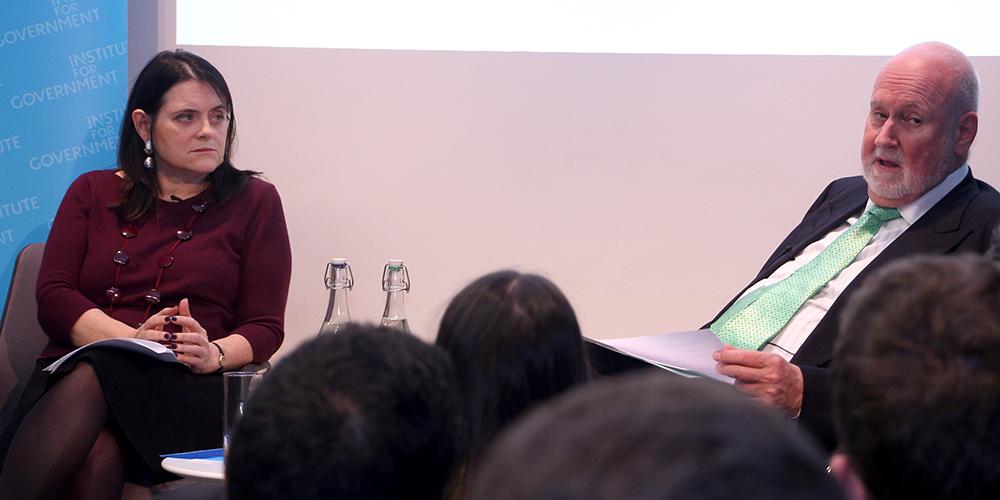EFTA Court President Carl Baudenbacher has proposed his court as a mechanism for enforcing the UK’s agreements with the EU after Brexit. The EFTA Court is a technically attractive solution, but one with political costs, says Lewis Lloyd.
The UK Government has committed to ending the direct jurisdiction of the European Court of Justice (ECJ) after Brexit. Accepting the ECJ’s oversight of the future UK-EU relationship, as the EU has proposed, would cross this red line. At the Institute for Government last week, President Carl Baudenbacher argued that ‘docking’ to the EFTA Court, which he has presided over for the last 14 years, is the only plausible alternative.

‘Docking’ to the EFTA Court after Brexit is likely to be negotiable, and avoids reinventing the wheel
The EFTA Court interprets and applies the laws governing the European Economic Area (EEA) for three European Free Trade Association (EFTA) states: Norway, Liechtenstein, and Iceland. ‘Docking’ would involve joining EFTA (but not the EEA), and asking the court to interpret the new UK-EU agreement or agreements for the UK, while the ECJ interprets for the EU.
In Dispute resolution after Brexit, we argued that docking to the EFTA Court has some significant advantages. First, it is likely to be negotiable. As President Baudenbacher noted, the EU proposed ‘docking’ to Switzerland in 2013, implying that this model could find favour in Brussels.
President Baudenbacher also pointed out that the court already exists. If the UK docked to the court, it would not have to create new institutions, which can take time and create uncertainty.
The EFTA Court may not be distant enough from the ECJ to satisfy the UK’s red lines
The EFTA Court’s relationship with, and to some extent its similarity, to the ECJ could make it a politically difficult sell for the UK Government. The ECJ and the EFTA Court are not supposed to diverge on the interpretation of Single Market law. If they do, then a joint committee with representatives from the EU and EFTA sides can refer the matter to the ECJ.
However, President Baudenbacher was keen to distinguish his court from the ECJ. He claimed that the EFTA Court has different, more market-oriented values than its larger counterpart. It does not have the same integrationist agenda as the ECJ, and its pragmatic style is more in keeping with the UK’s judicial system - whereas the ECJ follows the French legal tradition.
He also resisted the idea that the EFTA Court was a mere follower of the ECJ. For instance, a reference to the ECJ to resolve a judicial dispute has never happened, and the ECJ has, at times, followed EFTA Court rulings. Where Jean-Claude Piris, former Director General of the European Council’s Legal Service, has argued that the ECJ will ultimately prevail in any disagreement, President Baudenbacher maintained that it is the quality of reasoning that decides disputes.
The EFTA Court is not the only option for dispute resolution after Brexit – but all models come with challenges
In Dispute resolution after Brexit, we identified four others, in addition to the ECJ itself: a new EFTA-style court, a new joint UK-EU court, international arbitration, and ‘diplomatic’ dispute resolution by committees of officials.
President Baudenbacher argued that the experience of Switzerland gives some clues as to what the EU is likely to accept. Switzerland has previously proposed a ‘joint court’ to govern the relationship on both sides. Baudenbacher said the EU gave this “no chance”. Our paper explained why this might be so: a joint court would challenge the ECJ’s monopoly on the interpretation of the treaties for the EU – a red line that EU negotiators will not cross. Swiss proposals to create a national court to enforce bilateral agreements with the EU, akin to an EFTA-style court, have also been rejected.
Switzerland’s treaties with the EU are currently governed by joint committee, but as President Baudenbacher noted, the EU is dissatisfied with this arrangement.
Meanwhile, the UK Government has hinted it is hoping for an arbitration solution. Whether this will work ultimately depends on the content of the final deal. If it includes any EU law, the EU will want to make sure the ECJ retains the final say over that law. According to President Baudenbacher, the EU has rejected Swiss calls for the adoption of an arbitration mechanism in the past.
Dispute resolution will depend on the future relationship
The UK Government has yet to put forward proposals for the management of the future partnership with the EU. The extent to which the UK clashes with EU institutions on different areas of the law, as analysed in our recent report, may shape its approach.
But ultimately, if the UK wants the unprecedented deep and special relationship it seeks, it will need to accept effective enforcement and dispute resolution mechanisms. That will be high on the EU agenda when talks begin. Ministers will need to decide whether the EFTA Court offers a way through.
Watch the event
- Supporting document
- IfG_Brexit_dispute_resolution_WEB.pdf (PDF, 503.25 KB)
- Topic
- Brexit